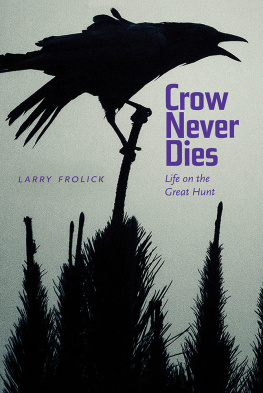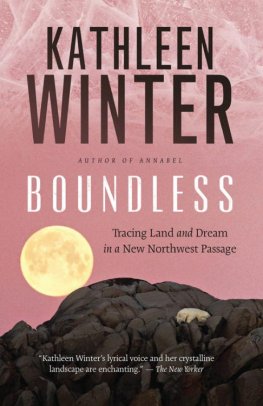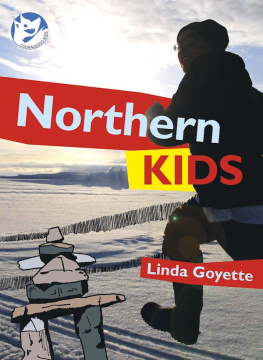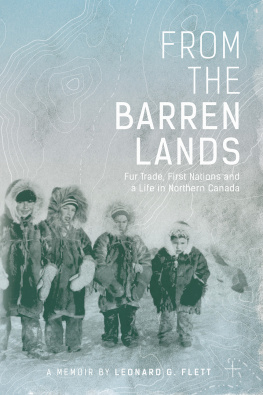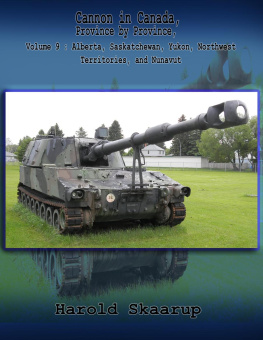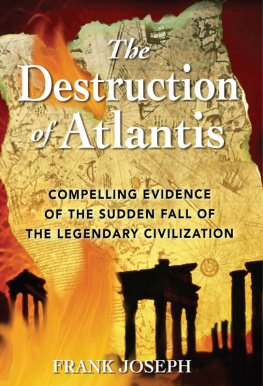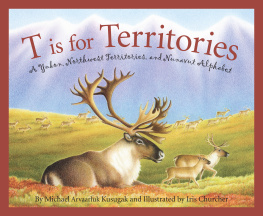Published by
The University of Alberta Press
Ring House 2
Edmonton, Alberta, Canada T6G 2E1
www.uap.ualberta.ca
Copyright 2016 text and photos, Larry Frolick. Foreword, Paul Carlucci.
LIBRARY AND ARCHIVES CANADA CATALOGUING IN PUBLICATION
Frolick, Larry, author
Crow never dies : life on the great hunt / Larry Frolick.
Includes bibliographical references and index. Issued in print and electronic formats. ISBN 9781772120851 (paperback).ISBN 9781772121469 (PDF). ISBN 9781772121445 (EPUB).ISBN 9781772121452 (mobi)
1. Frolick, LarryTravelCanada, Northern. 2. Native peoplesCanada, NorthernSocial life and customs. 3. HuntingCanada, Northern. 4. EcotourismCanada, Northern. 5. Canada, NorthernDescription and travel. 6. Canada, NorthernSocial life and customs. I. Title.
FC3956.F76 2016 | 971.9 | C20169028682 |
C20169028690 |
First edition, rst printing, 2016.
First electronic edition, 2016.
Digital conversion by Transforma Pvt. Ltd.
Copyediting and proofreading by Kirsten Craven.
Map by Wendy Johnson.
Indexing by Adrian Mather.
Cover design by Alan Brownoff.
Front cover photo: Regine Trias. Used by permission.
All rights reserved. No part of this publication may be reproduced, stored in a retrieval system, or transmitted in any form or by any means (electronic, mechanical, photocopying, recording, or otherwise) without prior written consent. Contact the University of Alberta Press for further details.
The University of Alberta Press supports copyright. Copyright fuels creativity, encourages diverse voices, promotes free speech, and creates a vibrant culture. Thank you for buying an authorized edition of this book and for complying with the copyright laws by not reproducing, scanning, or distributing any part of it in any form without permission. You are supporting writers and allowing University of Alberta Press to continue to publish books for every reader.
The University of Alberta Press gratefully acknowledges the support received for its publishing program from The Canada Council for the Arts, the Government of Canada and the Government of Alberta through the Alberta Media Fund.

For Sigfrid and Adamadventurers both.
Contents
Foreword
THERE ARE GRADATIONS TO THE NORTH, and its not enough to just put yourself up there, a few metres beyond 60, with the boreal forest crowding the edges of a couple dry highways, rough and bumpy, sure, but ever there if you need to bail back south.
Thats what I did for the year and a half I spent in Hay River, NT, just a little ways up there on the southern shore of Great Slave Lake. I did get to rub against the big, bright clichs of northern life: the inky, swirling aurora and stunning afternoon midnights, the ice jams and driftwood, bison on the ground and ravens in the sky. I got that, because it was there to be had.
But mostly I experienced that other northern clich, that one you dont read about in the guidebooks and booster-minded consumer magazines. This is the version defined by psychosis, and not the kind you might expect: all those well-trod parables about bush madness and sun frenzies. No, this stuff was urban malaise, sewn up tight and jammed into remote, small-town confines. It was drugs and booze and violence and despair, huge quantities of it, laced with the rollicking good times that come part and parcel with that kind of crashing lifeline.
I didnt get it at the time, but this negative north, this black-eyed north, it was the bastard son of the regal north. Its what happens when people stitch themselves into a culture striving toward the ideal, striving and failing, because only a few of its members are actually able to live the dream. Only a few of its members are hardy enough, skilled enough, and strong enough. My girlfriend at the time, she was of that ilk, getting her training wheels, sure, but already halfway down the driveway, top speed and gung-ho, and I guess there are just some people with a mind for it. Some people destined not just for the outposts huddled around 60, but for the huge tracts of land that lead to the coastand why stop there. Why not head out to sea, as well?
I wasnt so gung-ho. Im a guy who likes the monuments of man close at hand. They give me confidence, and maybe thats pathetic, maybe thats weak, but take a bushman and drop his ass into the blasting intersections of, say, Mexico City, and well see if he even makes it to the sidewalk. Fact is, I like pipes and lights, and when I dont, its usually just a few days before I start to miss them.
And so its like I said. The north has a gradation. A physical gradation. An experiential gradation. In a huge country like Canada, all beat up by provincial scorn and regional arrogance, Id never be considered a northerner, no matter how close to the pole I travelled. I just aint got the stuff.
But Larry Frolick does. And so do the people he writes about in this book. Theyre living the dream, replete with Arctic char and snorting caribou, with .22s and .30-30s, bannock and mukluk , the whole deal, every wheeling bird and fragrant flower, every legend and every folktaleand, yes, there are polar bears. But heres the thing of it. Even though you might think you know this story, might recognize it from some part of the so-called Canadian imagination, odds are you really dont. What you know might just be clich, runny little scoops of national identity, and weve all had enough of that.
Instead, Frolick offers something sweeter. He offers reality. He offers life. And even though hes talking about a bear when he writes these next five words, fact is, they pretty much apply to the whole experience: The psychic impact is terrific.
Read on.
PAUL CARLUCCI
Ottawa , June 21 , 2015
Preface
THE NORTH FORGIVES EVERY SIN BUT STUPIDITY, they say.
I have lived in the Northwest Territories for the past five years, and before that I travelled regularly to the Arctic since 2005 as a journalist. Much of that time was spent in uncertainty, and careful treading. The novel environmentor should I say environments?demands strict attention to every waking moment, to getting it right.
This account is inevitably encoloured by stupefied wonderment. Did I write truly and well about its people, its skies, the preternatural light? How its living power shows in every human task, in distant sounds? Echoes of wood chopping. Sandhill cranes in clouds. Spruces falling into shadow.
I hope the north and its peoples forgive me for an excess of delight in the freedom of its wild spaces.
Freedom, yes. Theres great comfort in knowing the stories I heard from Elders, hunters and truck drivers, craftspeople and artists, maybe old or invented just yesterday. Either way, they are always momentous storiesfreshly told, worth hearing again. The north answers questions I didnt know to ask.
I like its repletion. I like the way it fills you up with pure birdsong in summer and casts your eyes over the dazzling crystals of winter. Everyone here is secretly rich.
Introduction
SUMMER in the boreal forest.
The mad activity of a northern spring has subsided into a green- carpeted silence broken only by occasional chirps and warning whistles. The migratory songbirds have settled their disputes over the boundaries of their territories. Their clockwork patterns of shared nest keeping and foraging duties create an intricate counter-rhythm to the fricatives of the wind rasping through spruces. A grove of white birches frames an endless expanse of detail congealed into hazy abstraction by vast distance. If we could but read the dense textures of the forest, we would know everything.
Next page
